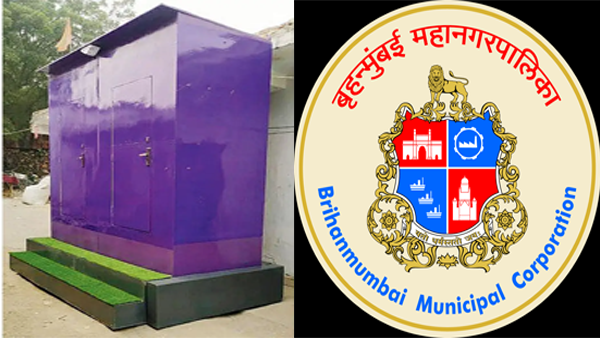Maharashtra
Bio-loos plants will be Intalled soon on 6 wards in Mumbai : BMC

In a pilot project, the BMC is set to install bio-toilets at four locations each in six wards. The civic body had earlier started a similar project but the toilets did not work for long due to poor maintenance. This time, with an operation and maintenance contract in place, the civic body aims to gauge if this can be used across the city where sewer networks are not available. The Brihanmumbai Municipal Corporation, which is in the process of increasing the number of community and public toilets, especially in slums and high footfall areas, took up the project to cater to the people living in areas without a sewer network and areas with a space crunch.
Bio-toilets are based on biodegradation techniques where organic substances are decomposed by micro-organisms, mainly bacteria, into simpler substances such as carbon dioxide, water and ammonia. Though bio-toilets have many advantages, its performance depends upon the sustainability of micro-organisms. Bacterias have the ability of self growth, but the use of chemicals in toilet cleaners are harmful to them.
As part of the project, BMC has selected six wards—P North (Malad), P South (Goregaon), S (Bhandup), N (Ghatkopar), M East (Govandi, Mankhurd) and F North (Wadala, Sion)—to install the bio-toilets within next six months.
“Each of these toilets has two seats, one for men and another for women. There is a pit which is a part of installation and does not require much digging or other infra. A connection of water and electricity is enough. So, it will work best in areas which have space constraints or no existing sewer network,” said an official from BMC’s solid waste management department.
He added that a work order of Rs 4.14 crore which includes supply, installation, commissioning as well as operation and maintenance for three years has already been given. The feasibility study of the spots is going on and the report is expected within two weeks, following which the installation will begin.
“If it works, we are thinking of implementing it across the city. It will be useful in places where we cannot build traditional toilets due to various reasons,” said Sangita Hasnale, deputy municipal commissioner. The performance of these toilets will be analysed after three months to decide on further installations.
4 No of bio-toilets to be installed in each of the six wards
Crime
Mumbai Crime: 26-Year-Old Man Arrested For Sexually Assaulting 10-Yr-Old Boy In Lower Parel Railway Yard

Mumbai: The Churchgate Police have arrested a 26-year-old man under the POCSO Act (Protection of Children from Sexual Offences) for allegedly sexually assaulting a 10-year-old boy in the Lower Parel railway yard area on January 31. The accused is currently in police custody.
According to the Government Railway Police (GRP), the incident occurred on January 31 between 9:30 AM and 11:00 AM. The accused, a native of Madhya Pradesh, is unemployed and lives on footpaths in Mumbai. He has a criminal history, with several cases of theft registered against him at various police stations.
The investigation revealed that the accused lured the boy by promising him Rs.10,000 for watching a bag. He told him that his bag was stuck in the local train. He took the boy from Churchgate on a local train and alighted at Lower Parel. There, he led the boy inside the yard to a parked train and sexually assaulted him before fleeing.
The victim was found crying by the Mumbai Central Railway Police, who then traced his mother. The boy’s family resides on a railway platform. A case was registered and transferred to the Churchgate Railway Police Station.
Using CCTV footage and human intelligence, the police arrested the accused. The Churchgate Railway Police have registered a POCSO case against him. The boy is in the 3rd standard.
Crime
Mumbai Police’s Anti-Narcotics Team Attacked By Suspected Drug Traffickers In Navi Mumbai; Several Injured

Navi Mumbai: In a shocking incident, the anti-narcotics team of the Mumbai Police was attacked by suspected drug traffickers during an operation in the Ulva area of Navi Mumbai last week. The incident occurred when the team conducted a raid in the Ulva locality while tracking suspects linked to a drug trafficking case who were located near Shagun Chowk.
When officers attempted to arrest them, the accused allegedly launched a violent attack on the police team using sharp weapons, including choppers, swords, hockey sticks and a village axe. In the attack, Assistant Police Inspector Kiran Mandhare of RCF Police Station was injured in the attack. Other police personnel, including Firoz Siddiqui, Ahmed Raza Qureshi and Atul Jaisawal, also sustained injuries and are currently undergoing treatment.
Following the attack, the senior police inspector at the Ulva Police station immediately sent a team of police for help. Moreover, a case has also been registered against all eight accused.
The report also stated that the Mumbai Police team did not seek help from the local police station before conducting the raid and had not informed the Navi Mumbai Police in advance about the operation.
Earlier In January 2026, three men were taken into custody for allegedly arguing with and assaulting traffic police personnel during a vehicle-checking drive at a naka bandi in Panvel on New Year’s Eve, leaving a traffic constable injured.
The incident took place around 2.30 am on December 31 at Shivshambho Naka, where traffic police had intensified checks as part of security arrangements for New Year celebrations.
Maharashtra
BMC Announces Strict Sanitation Fines In Mumbai: ₹250 Fine For Spitting, ₹500 For Littering & ₹25,000 For Transporting Garbage Without License

The Mumbai Municipal Corporation has stepped up efforts to improve cleanliness and sanitation across the city by intensifying awareness around solid waste management rules and imposing penalties for violations. The move is part of a broader push to ensure cleaner public spaces and better waste handling practices across residential, commercial and public areas.
The civic body is creating awareness about regulations related to waste generators, establishments, waste service providers and solid waste processing. These rules govern the storage, segregation, transportation, and disposal of waste. Officials have made it clear that strict penalty action will be taken against citizens and establishments that fail to comply.
Under the revised enforcement, fines have been specified for common violations. A penalty of Rs 250 will be imposed for spitting in public places. Dumping garbage will attract a fine of Rs 500, while failure to segregate wet and dry waste will result in a fine of Rs 200. Transporting garbage without a valid licence will invite a penalty of Rs 25,000.
As per the directions of Municipal Commissioner Bhushan Gagrani, regular action is being taken to maintain cleanliness within municipal limits. Additional Municipal Commissioner City Ashwini Joshi, under the guidance of Deputy Commissioner Solid Waste Management Kiran Dighavkar, said continuous efforts are being made to strengthen solid waste management systems in the city.
Special cleanliness drives and activities are also being organised from time to time to reinforce these measures.
The bylaws will apply to all waste generators and to public and private places. This includes residential buildings, business and commercial establishments, professional and industrial premises, government and semi-government offices, educational institutions, religious places, recreational spaces and all other areas of public use.
The focus of the rules is on preventing littering and nuisance, ensuring clean premises and mandatory segregation of solid waste at source.
The regulations lay down detailed responsibilities regarding storage and collection of municipal solid waste, duties of producers, municipal authorities, representatives and contractors, and the handling of material recovery facilities. They also cover biomedical waste, e-waste, construction and demolition debris and plastic waste.
Additional fines have been announced for specific offences. Throwing garbage on roads, footpaths, gardens or public places will attract a fine of Rs 500. Bathing in public places will result in a fine of Rs 300. Urinating or defecating in public places will attract a fine of Rs 500 each. Feeding animals or birds in public spaces will also invite a fine of Rs 500.
Failure to keep courtyards or premises clean can result in fines ranging from Rs 500 to Rs 1,500.
Dr Ashwini Joshi appealed to citizens and establishments to strictly follow the bylaws and cooperate with the municipal corporation in keeping Mumbai cleaner and more beautiful.
-

 Crime3 years ago
Crime3 years agoClass 10 student jumps to death in Jaipur
-

 Maharashtra1 year ago
Maharashtra1 year agoMumbai Local Train Update: Central Railway’s New Timetable Comes Into Effect; Check Full List Of Revised Timings & Stations
-

 Maharashtra1 year ago
Maharashtra1 year agoMumbai To Go Toll-Free Tonight! Maharashtra Govt Announces Complete Toll Waiver For Light Motor Vehicles At All 5 Entry Points Of City
-

 Maharashtra1 year ago
Maharashtra1 year agoFalse photo of Imtiaz Jaleel’s rally, exposing the fooling conspiracy
-

 National News1 year ago
National News1 year agoMinistry of Railways rolls out Special Drive 4.0 with focus on digitisation, cleanliness, inclusiveness and grievance redressal
-

 Maharashtra1 year ago
Maharashtra1 year agoMaharashtra Elections 2024: Mumbai Metro & BEST Services Extended Till Midnight On Voting Day
-

 National News1 year ago
National News1 year agoJ&K: 4 Jawans Killed, 28 Injured After Bus Carrying BSF Personnel For Poll Duty Falls Into Gorge In Budgam; Terrifying Visuals Surface
-

 Crime1 year ago
Crime1 year agoBaba Siddique Murder: Mumbai Police Unable To Get Lawrence Bishnoi Custody Due To Home Ministry Order, Says Report






















